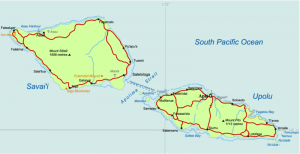Biography
Born on April 11, 1951, Sapa’u Ruperake Petaia is a published poet. He served as the Director of the Ministry of the Post and Telecommunications for the island nation of Samoa. He received his Bachelor’s Degree in Public Administration and Economic Geography from the University of the South Pacific in Suva, Fiji, in 1980. Sapa’u also has a Master’s in Public Administration from Trinity University (USA), which he earned through their long-distance learning program. After completing his undergraduate degree at Samoa College, Petaia returned to Western Samoa where he worked in the Public Service Commission, restarting a career that began in 1973. In 1987 he was appointed Deputy Secretary of the Commission. In 1989 he was appointed the Director of the then Post Office Department, and in 2000 he was delegated and appointed to his present position.
Brief History of Samoa

The Dutch first visited Western Samoa in 1722. However, people of Polynesian descent primarily inhabit the island to this day. The Second Samoan Civil War resulted in the U.S. annexation of eastern Samoa (still an American territory and called American Samoa) and German control of the western islands in 1899. New Zealand occupied the German islands in 1914 during World War I, and subsequently administered them as a League of Nations mandate and a UN Trust Territory. They gained independence as Western Samoa in 1962. Executive power rests in a chief of state, chosen by the legislative assembly from among the royal families. The Samoan clan chiefs are responsible for choosing the majority of the members in the legislature. Chief Susuga Malietoa Tanumafili II was head of state from 1962 to his death in 2007. In 1997, the country dropped “Western” from its official name. The Flag of Samoa shows three quarters red, with the upper left quadrant blue. The interior of this area contains five white stars depicting the Southern Cross.
Major Themes in Petaia’s Writing
Petaia’s poetry criticizes the legacy of British influence on different facets of Samoan life. In “Kidnapped” he opposes the institution of an Anglicized educational system. Alluding to his academic training as a metaphorical “kidnapping,” he implies that his teachers (white colonialists) had essentially stolen him from his mother (representing the native culture or “patria”). Markedly politicized and distinctly accusatory in tone, this poem voices the perspective of the colonized and rejects the ideologies Western imperialism. Other themes throughout his work include elements of nature and historical facts.
Q & A with S. Ruperake Petaia
Q: So, where to from here?
“It is my serious intention to leave the public service at the end of my current contract. However, the feeling now is, it’s time to move on to my other areas of interests like working in the plantation, being involved directly with village matters as a matai [head of the family] and looking after the aiga and church commitments. I want the younger fellas and the more versatile, energetic qualified people to take over in the best interest of the country’s development.”
Q: I wasn’t sure whether I was going to ask this question. What about politics?
“Well, maybe, but I don’t feel the urge to take up politics. Hey, but who knows!”
Q: From when does your first memory of rebellious behavior or thinking come?
“Hmm . . . well, when I was six years old, I used the crayons from art class to draw on my lunchbox.”
Q: What was the subject of the first poem you wrote, and how old were you then?
“I was fourteen. I think it was some sort of love poem, but I don’t really remember, and it was certainly never published!”
Q: Why did you choose to examine the institution of education in ‘kidnapped’ as opposed to governmental or religious influences?
“In the Pacific Islands, education is where the Western influence is most felt.”
Q: What is your preferred mode of writing for publication (i.e. poetry, prose, journalism, etc.)?
“Poetry is my preferred medium . . . it allows me to be succinct.”
Q: As a follow-up question, do you intend to publish anything in the near future?
“Yes, I do, but I won’t say what or when!” [From telephone interview, conducted by David Klivans on 11/07/01]
Works by S. R. Petaia
- Petaia, Sapa’u Ruperake. Blue Rain: Poems by Ruperake Petaia of Western Samoa. Suva: Institute of Pacific Studies, 1991.
Works Cited
- Ashcroft, Bill. Post-colonial Transformation. London: Routledge, 2001.
- Thieme, John (ed.) The Arnold Anthology of Post-colonial Literatures in English. London: Arnold, 1996.
Related Links
Pacific Island Books
http://www.pacificislandbooks.com
Western Samoa Geography
http://www.theodora.com/wfb/western_samoa_geography.html
Author: David M. Klivans, Fall 2001
Last edited: May 2017